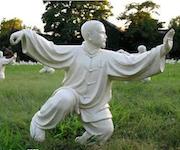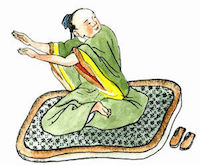Longevity, Heatlh with Tai chi chuan and Chi Kong
 As a general rule, older intellectuals enjoy Taijiquan (Tai chi chuan boxing). The old master Wu Tunan, born in 1885, precursor of this boxing, knew medicine, literature, archeology and music. It's this boxing that gave him a centenary life.
As a general rule, older intellectuals enjoy Taijiquan (Tai chi chuan boxing). The old master Wu Tunan, born in 1885, precursor of this boxing, knew medicine, literature, archeology and music. It's this boxing that gave him a centenary life.
At the age of 99, Master Wu participated in the international Taiji demonstrations held in the Chinese city of Wuhan. He won a prize.
Wu Tunan had a small health in his childhood.
He suffered from several diseases: pulmonary tuberculosis, icteric hepatitis, epilepsy, splenomegaly (swelling of the spleen), etc. In spite of the remedies he swallowed every day, these ills always assailed his little skinny body like a match. His parents believed his days were numbered.
When he was 9, his father took him to a doctor at the imperial palace. Without prescribing a cure, the doctor advised him to train for physical exercises. It was then that he began to learn taiji from renowned masters.
After 10 years of laborious practices, his illnesses disappeared one after the other. He was in perfect health and graduated from the Capital Grande Ecole with brilliant results. At the age of 23, Wu Tunan wrote a book titled "Scientific Taiji Boxing".
This is one of the first didactic books on this Chinese boxing. This book was followed by several works such as "The Study of Taiji Boxing", "The Doctrine for Long Life", etc. He thus made a significant contribution to the development of this traditional Chinese sport among the population. His wife was also very sick. She learned taiji from her husband, so that all her illnesses disappeared. Aged over 90, she is in excellent physical condition..
She did not spend a single day without strolling and training in boxing with her old friend..
Many elderly city dwellers persevere in qigong (Chi Kong), the art of breathing. The very old ones train most often by uniting the dynamic and static effects. chi kong Peng Yutang, a hundred-year-old doctor from Chengdu, suffered from pulmonary tuberculosis at the age of 48 due to overwork. He began to practice the art of heart care by combining dynamic and static approaches.
This process combines qigong and daoyin.
 At the end of three years of diligent exercises, her illness disappeared without any medical care. Mr. Peng was originally reeling. He became a doctor by going to the school of his healer. Recovering his health, he never gave up on physical training. As a result, at the age of 100, he could still receive sick and prescribe prescription
At the end of three years of diligent exercises, her illness disappeared without any medical care. Mr. Peng was originally reeling. He became a doctor by going to the school of his healer. Recovering his health, he never gave up on physical training. As a result, at the age of 100, he could still receive sick and prescribe prescription
He was able to step up the three-story stairs without running out of steam or experiencing any fatigue.
He Xiqing, 104, in Shanghai, is also a supporter of this art of dynamic and static links.
Becoming a monk at the age of 17, he mastered the art of static qi gong (Chi Kong) called "rest and concentration of contemplation".
In his youth, he learned Chinese martial arts (wushu or Kung fu) in Tianjin and excels in mizong boxing created by Huo Yuanjia. He practices static qigong and boxing every day, without stopping for many years. .
Today, despite his 104 years, he walks 4 km each day to practice boxing in a park.
These examples prove that physical exercises, especially qigong (vhi kong) and taiji boxing (tai chi chuan), practiced with tenacity, constitute a condition of major importance for the longevity of centenarians in the city.
